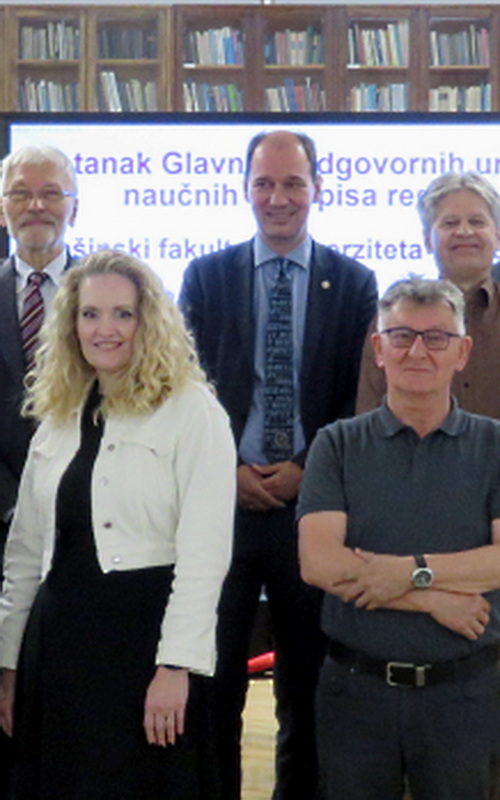Regional meeting of journal editors: Struggling of small publishers to survive
Main Article Content
Abstract
At the end of May 2024, a traditional regional meeting of editors of small scientific journals in engineering disciplines was held at the Faculty of Mechanical Engineering in Belgrade. This year the meeting gathered about 20 editors who discussed novelties, good practices as well as problems in academic publishing. The primary aim of these journals was to support the local scientific community and industry by providing a platform for presenting scientific advances, connecting research and practice, and assisting young scientists in publishing their research results. However, with the widespread adoption of measuring scientific performance by publication and citation statistics, the scientists lost interest in these journals as underrated in researcher evaluation systems. Thus, low quality of received as well as revised manuscripts, low response rates of reviewers, and, consequently, long processing times and high rejection rates are some of the main problems mentioned at the meeting. All these issues are usually managed by editorial offices, which often have neither technical nor human resources for such endeavors. Still, the conclusion of the meeting was that the benefits of small independent scientific journals are significant and worth efforts particularly for providing an alternative to the profit-oriented publishing and promoting societally relevant research and value-based scientific assessments.
Article Details

This work is licensed under a Creative Commons Attribution-NonCommercial-NoDerivatives 4.0 International License.
Authors who publish with this journal agree to the following terms:Authors retain copyright and grant the journal right of first publication with the work simultaneously licensed under a Creative Commons Attribution License that allows others to share the work with an acknowledgement of the work's authorship and initial publication in this journal.
Authors grant to the Publisher the following rights to the manuscript, including any supplemental material, and any parts, extracts or elements thereof:
- the right to reproduce and distribute the Manuscript in printed form, including print-on-demand;
- the right to produce prepublications, reprints, and special editions of the Manuscript;
- the right to translate the Manuscript into other languages;
- the right to reproduce the Manuscript using photomechanical or similar means including, but not limited to photocopy, and the right to distribute these reproductions;
- the right to reproduce and distribute the Manuscript electronically or optically on any and all data carriers or storage media – especially in machine readable/digitalized form on data carriers such as hard drive, CD-Rom, DVD, Blu-ray Disc (BD), Mini-Disk, data tape – and the right to reproduce and distribute the Article via these data carriers;
- the right to store the Manuscript in databases, including online databases, and the right of transmission of the Manuscript in all technical systems and modes;
- the right to make the Manuscript available to the public or to closed user groups on individual demand, for use on monitors or other readers (including e-books), and in printable form for the user, either via the internet, other online services, or via internal or external networks.
How to Cite
References
Neff MW. How academic science gave its soul to the publishing industry. Issues Sci Technol. 2020; 36: 35–43.
Priyanto IF. The struggle of open access publishing: The Indonesian perspective. In: Alemneh D, ed. Handbook of research on the global view of open access and scholarly communications. Hershey, PA: IGI Global; 2022: 65-80. https://doi.org/10.4018/978-1-7998-9805-4.ch004
Drvenica I, Dekanski A, Buđevac N, Umeljić I, Nedić O. Is there a need for systematic education on peer-reviewing in Serbia? Hem Ind. 2019; 73(5): 275–279. https://doi.org/10.2298/HEMIND191020029D
Holly E. Group to establish standards for AI in papers. Science. 2024; 384(6693): 261. doi: 10.1126/science.z9gp5zo
Obradovic B. Connecting science and industry with improved communication of research results. Hem Ind. 2019; 73(2): 73-77. https://doiserbia.nb.rs/Article.aspx?ID=0367-598X1902073O
Fernandez-Moure JS. Lost in translation: The gap in scientific advancements and clinical application. Front Bioeng Biotechnol. 2016; 4: Article 43. https://doi.org/10.3389/fbioe.2016.00043
Kaltenbrunner W. Situated knowledge production, international impact: Changing publishing practices in a German engineering department. Minerva. 2018; 56: 283-303. https://link.springer.com/article/10.1007/s11024-017-9337-x

